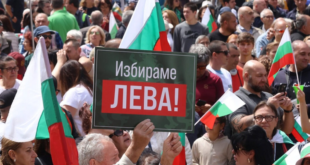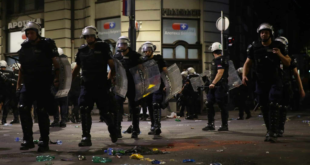 Kosovo is making progress and is ready to move ahead, Soren Jessen-Petersen told the UN Security Council on Tuesday (20 June). Calling for an early and successful conclusion of the talks on the province’s final status, the outgoing UNMIK chief warned that delaying a decision could threaten stability and progress.
Kosovo is making progress and is ready to move ahead, Soren Jessen-Petersen told the UN Security Council on Tuesday (20 June). Calling for an early and successful conclusion of the talks on the province’s final status, the outgoing UNMIK chief warned that delaying a decision could threaten stability and progress.
“I hold that, after seven years of (UN) interim administration in Kosovo, society is ready — indeed impatient — to move on, and that in fact it would be a far greater risk to keep Kosovo in limbo for much longer,” Jessen-Petersen said in his last briefing before leaving his post at the end of this month.
Technically still part of Serbia, Kosovo has been under UN administration since the end of the 1998-1999 conflict in the province. Direct, UN-led talks between Serbian and Kosovo Albanian officials opened in Vienna in February, with the critical status issue expected to come up for negotiation in late July. Western powers involved in the process want to see a settlement reached by the end of this year.
UN Secretary General Kofi Annan’s latest report on Kosovo — discussed by the Security Council on Tuesday — concluded that despite some progress in the status talks, the Serbs and the Kosovo Albanians remain far apart and compromise is needed.
It also stressed the need for implementation of a set of internationally endorsed standards in eight areas, including rule of law, democratic institutions, minority rights and the economy.
However, Jessen-Petersen said the implementation of standards has been revitalised in recent months under the province’s new leadership. He also praised Kosovo Prime Minister Agim Ceku for working to achieve stable progress in the province and for reaching out to minority groups, particularly the Kosovo Serbs.
“Despite all efforts, the fact remains that the situation is very difficult for the majority of Serbs in Kosovo and that they feel confused and isolated, and that they do not know what to think about the future,” Jessen-Petersen said. “I do not see how they can make informed choices and decisions about their own future within Kosovo if they are not even permitted to take part in the democratic processes there, whether centrally or locally,” he noted, criticising Belgrade for its “isolationist policy”.
The UNMIK chief urged the Serbian authorities to withdraw a “damaging directive” obliging Kosovo Serbs working for certain Kosovo institutions to choose between their Belgrade and Pristina salaries.
Addressing the Security Council, the head of Serbia’s Co-ordination Centre for Kosovo, Sanda Raskovic-Ivic, rejected Jessen-Petersen’s remarks, saying the Kosovo Serbs should join the province’s institutions only if their participation was meaningful. According to her, the province has made little progress to resolve Serb property rights and human rights.
“The very right to survival of Serbs and non-Albanians, a definite minority in the province, has been threatened,” the AP quoted her as saying.
Reiterating Serbia’s opposition to independence as a possible outcome of the status talks, she said any “either-or” solution — which made one side a winner and the other a loser — was not good. The settlement to the Kosovo issue should be found through dialogue and must not be imposed from the outside, she added.
 Eurasia Press & News
Eurasia Press & News



